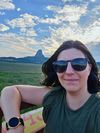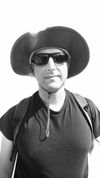Recovering from surgery in an RV! How we manage medical appointments while full-time traveling
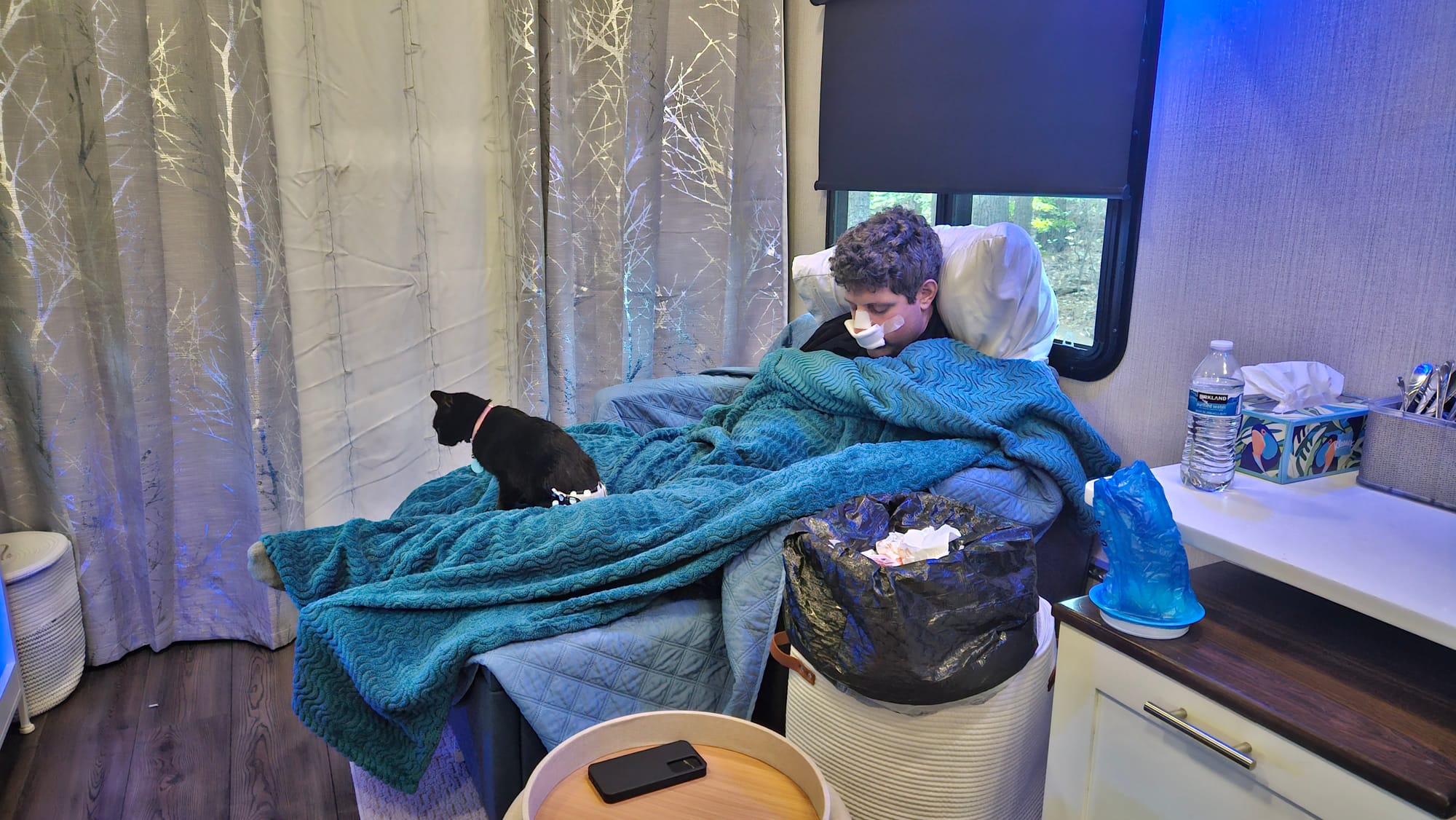
One of the most common questions prospective full-time RVers ask is what to do about healthcare. Unfortunately, it's not a question with an easy answer because so much depends on individual needs, insurance, and current health status. As two younger RVers who are still working, our situation is simple. Anthony gets health insurance through his job, and that insurance covers us nationally. Our biggest issues have been the legal stipulations of remote medical appointments. We have had experiences where medical providers won't talk to us if they're licensed in our home states and we're not physically in that state at that time. It's a frustration that we hope will one day go away, when legalities catch up to modern medical care. Virtual appointments are becoming more and more frequent, and so is extended travel. But, legal changes move at a snail's pace, so for now, we wait.
Being able to use our insurance anywhere in the country is helpful if we experience a medical incident or emergency while we're traveling. We made sure we'd have adequate coverage for these situations. But, when it comes to routine medical care, we do what many RVers do: Squeeze all our appointments in whenever we're back home. This way we could keep our same doctors who already know us and our medical history. The challenge in this for us, though, is that we're from Massachusetts, so in order to see our doctors, we need to plan travels up to the Northeast. Unlike our nomadic friends who are from states like Texas and Tennessee, we're never just passing through our state. It takes ample planning ahead of time to get up to this tucked-away corner of the country. Our simplest solution was to plan to return every Thanksgiving and Christmas. We love spending the holidays with family, we love New England during the holidays, and we typically have good luck finding available appointments for this time of year because everyone else is so busy with other things, they're not prioritizing doctor visits.
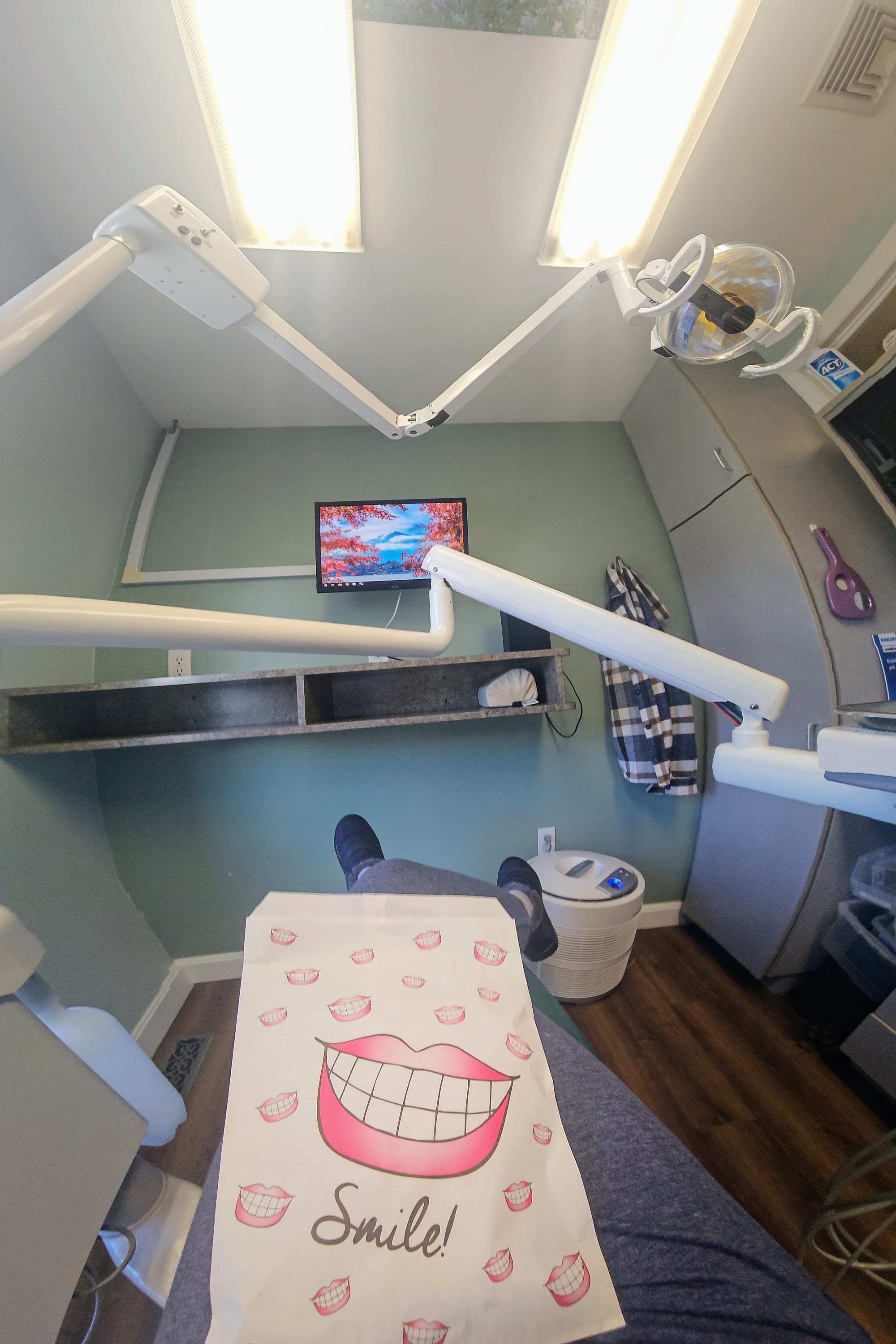
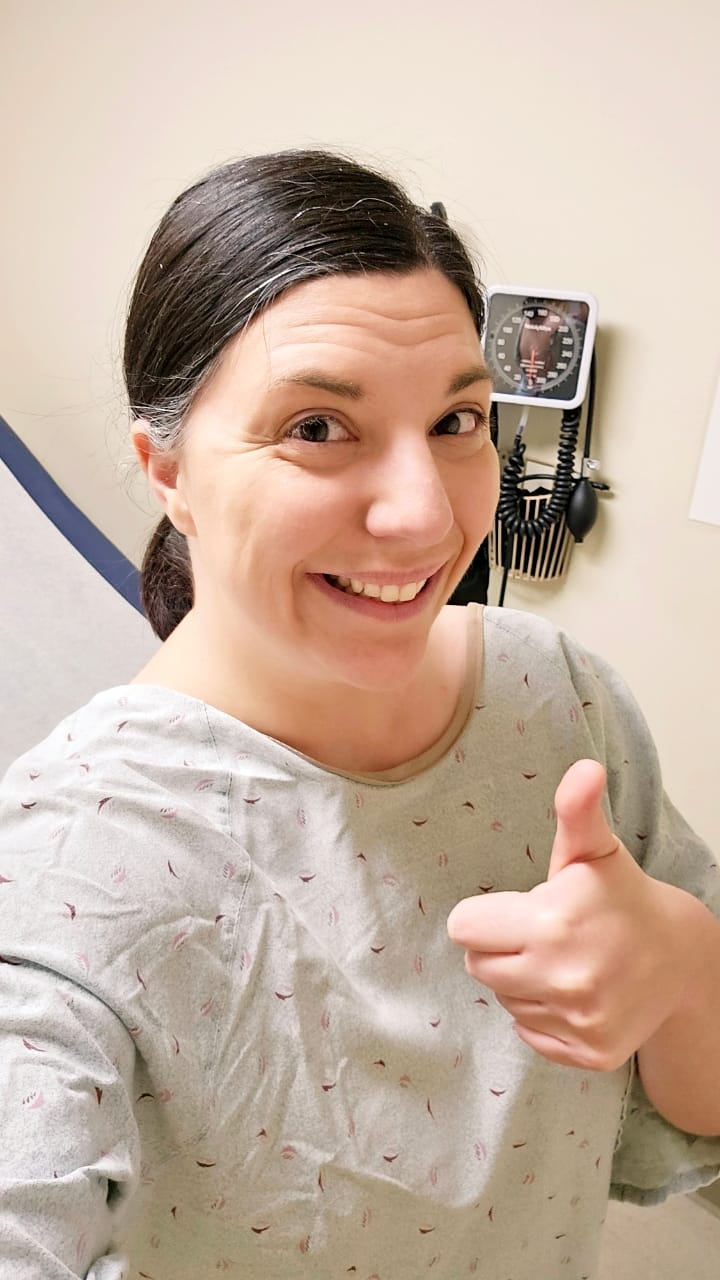
Before we launched full-time, we alerted our doctors to our plans. We've heard all kinds of stories about people not responding positively to the nomadic lifestyle, and these reactions include doctors. We didn't have that problem. Every doctor we told was supportive and excited for us. Again, we think this might be due to our age. We don't have many health risks, so doctors aren't particularly worried if we're off gallivanting in our RV 320 days out of the year.
We might be young, but our pets are not. Lily is 14 and Tanner is 12, and so as seniors, they demand a lot more care on the road, especially Lily, who has had chronic bacterial cystitis since 2017. Lots of RVers choose to switch their pets' veterinary care over to a more nationally-recognized clinic before hitting the road. Think Banfield Pet Hospital, which operates out of PetSmart. This is so the pet files are on record at every Banfield location, so vets aren't playing catch-up whenever the pet goes somewhere new. We do this with Tanner's grooming; he's gotten groomed at PetSmart his whole life, and so we just choose PetSmart locations whenever he's in need of a grooming appointment. We also did this for medicine, switching prescriptions to Walmart because chances were high we'd always be near one. However, for veterinary care, we stuck with our local clinic. We did this for a few reasons:
- Our local vet knows our animals and their needs. They grew up seeing this vet, and since they both have special health-related circumstances, we need a doctor that has a good rapport with both us and the pets.
- Lily's history is extremely complicated, and it would be a major hassle to catch a new vet up just for routine care. We'd rather just tell Lily's info on an as-needed basis.
- Our vet has been unbelievably supportive of our decision to travel, and we easily keep in touch through email and phone calls. They've allowed us to stockpile Lily's meds for when she has flare-ups, simply because they've known us for years and trust us as pet owners.
Before we launched, we made sure to get PDF versions of both pets' records. This way, if we ever need to take them somewhere on the road, we have their files on hand in case the vet isn't open.
So far, we've only needed to utilize one vet on the road, last year, when Lily stopped responding to her antibiotics. It was really hard convincing a new vet that Lily's diagnosis is accurate, and that we are extremely researched and knowledgeable humans. This experience made us even more thankful for our local vet clinic.
As for the pets' routine care, we try to time their exams and vaccinations for when we're back in the area. This year, we got a little off-schedule because they had care in the summertime last year, but couldn't have their appointments until November this year. This meant that they were both a few months overdue on some vaccinations, but it wasn't anything too extreme. We just got them their shots as soon as we could. We opt for 3-year Rabies vaccinations for each of them, so we don't need to worry about those expiring each year on the road. The rest of their shots are annual and will now be due at the end of the year.
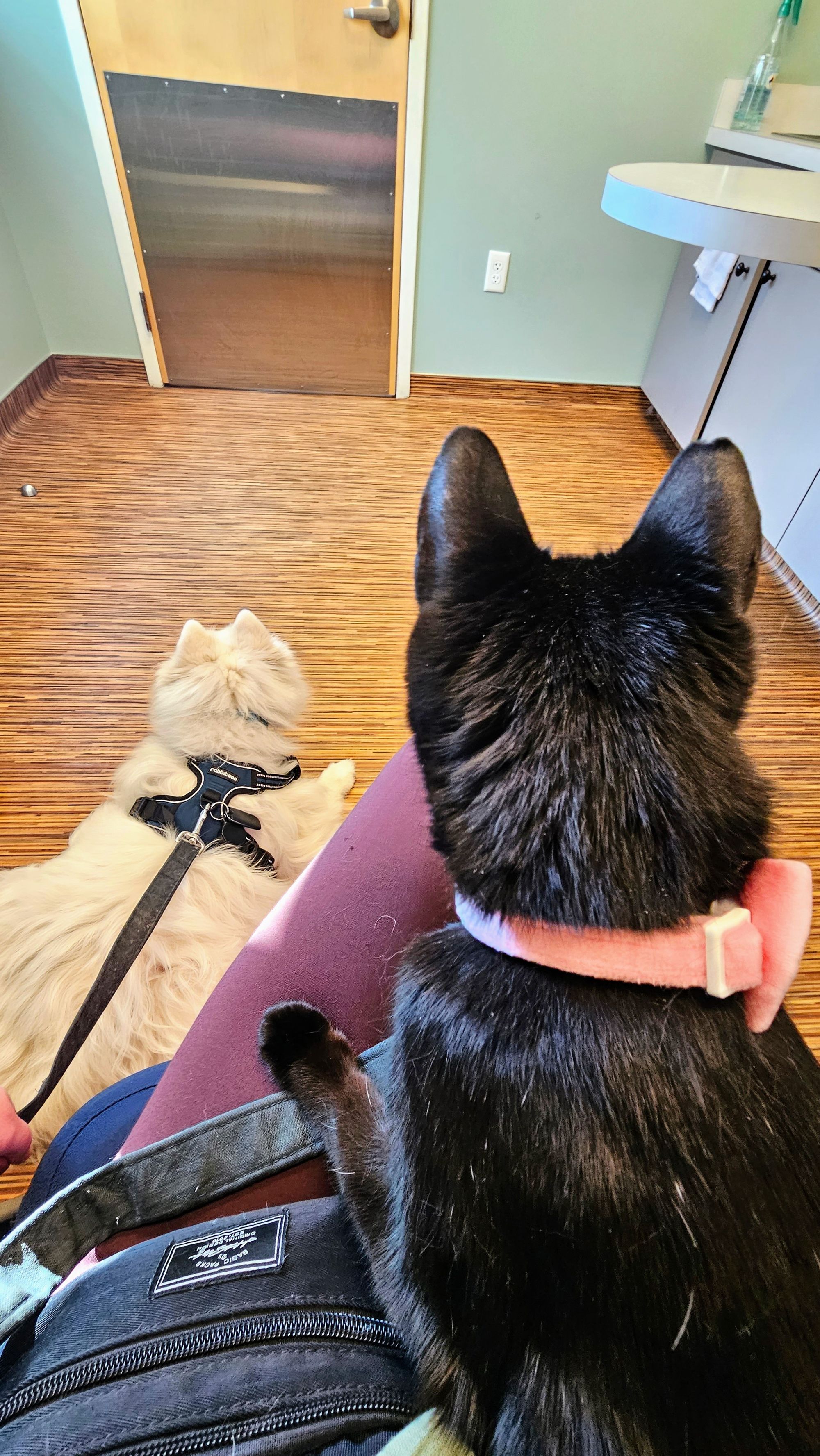
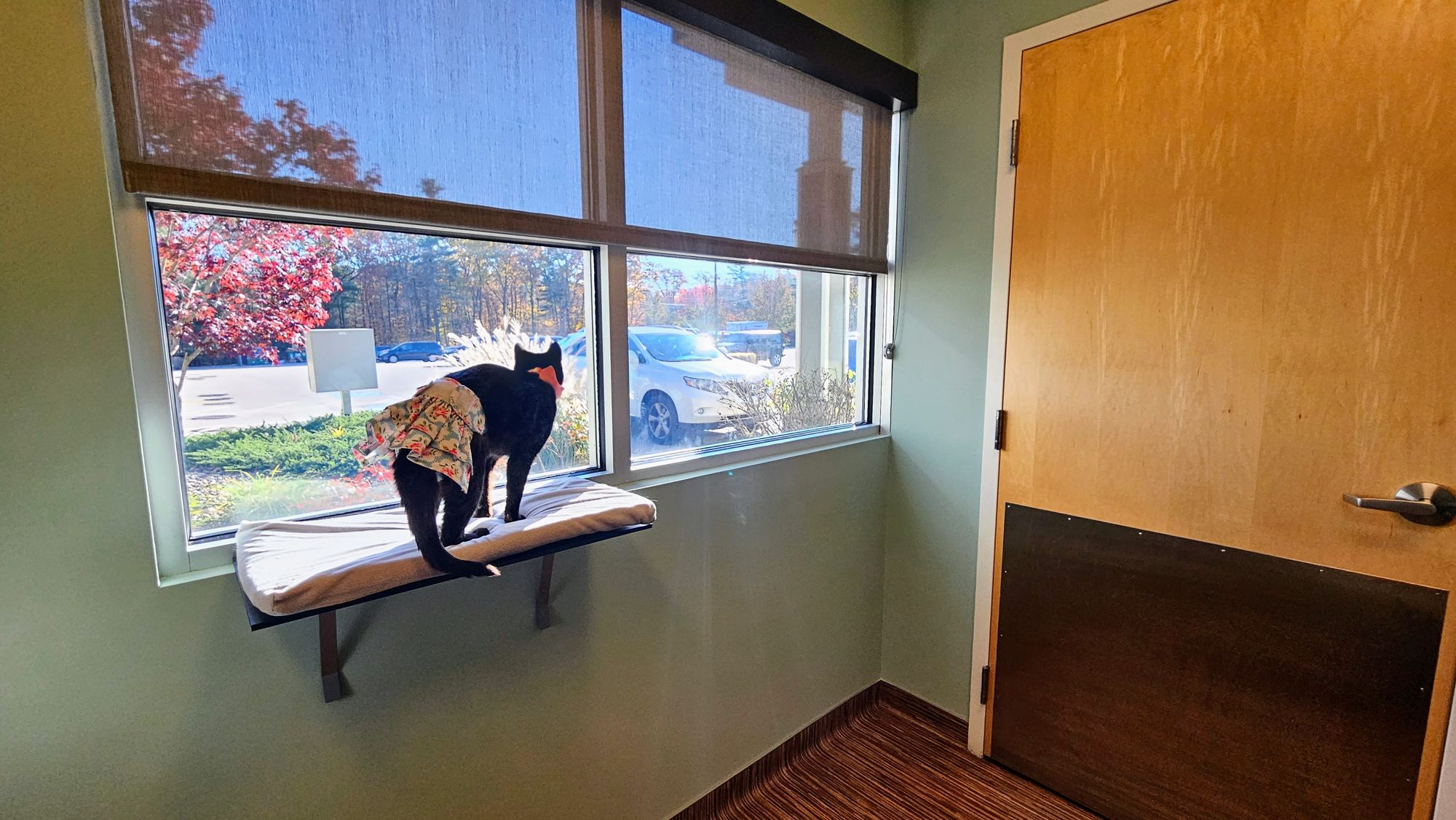
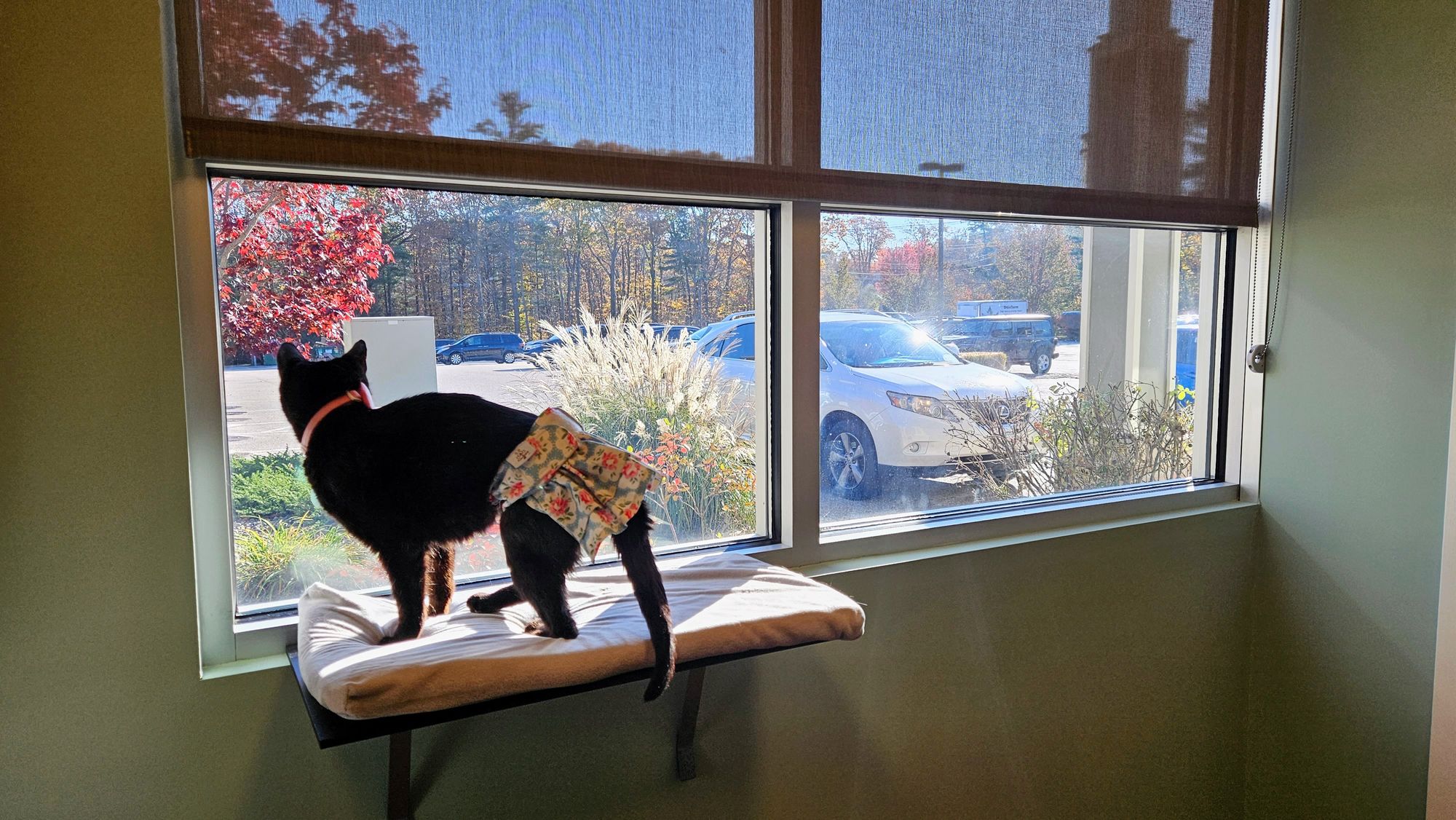
The babies being so good at their doctor's appointment!
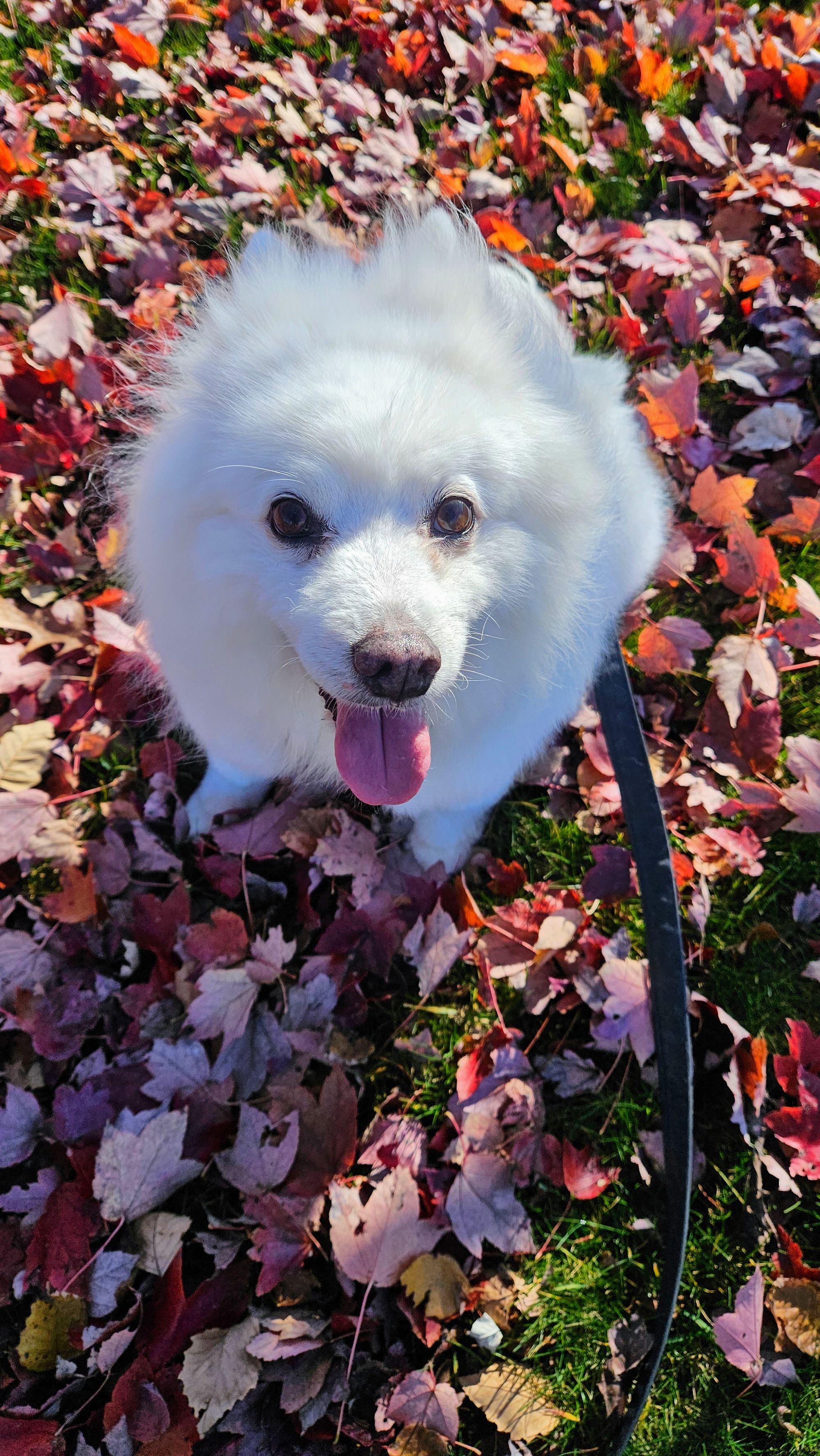
Typically, our medical appointments entail our yearly check-ups and examinations: General, GYN, eye exams, and dermatology. We can't always get every appointment every year, but we try our best. The biggest obstacle we face is with our dentist appointments, since those are supposed to be done twice a year. Fortunately, teeth cleanings are one of the easier things to get on the road, since dental is a different insurance that tends to be more lax, or people just pay for the cleanings out-of-pocket. We haven't ever seen a dentist on the road, but we'd consider it. I've been given a temporary go-ahead from my hygienist to just do an annual cleaning. Anthony...well, he had bigger fish to fry this year.
As we mentioned in our Blitz East Series, we needed to get home before November 10th because Anthony had nasal surgery. There's no one better to tell this story than Anthony himself, and so it's time to change authors on this post.
Anthony, take it away!
I don't know where to start from! Snorts through his swollen nose. I've had problems breathing since as long as I can remember. One of the biggest issues was mucus production. I had to carry so many tissues with me at school that sometimes an entire box wasn't enough, and so I'd take entire rolls of toilet paper in my backpack instead. I had to worry about what I could eat because sometimes the food would create so much phlegm that I'd wind up throwing up. I was tested for allergies but nothing severe turned up. My parents often took me to the doctor thinking I had sinus infections, but that wasn't the case. Thus started many "There's nothing I can do" responses from doctors, and as the years went by, I just learned to live with it.
As all this was going on, I was also battling what doctors call "hypersomnia." In other words, I am tired all the time and fall asleep far too easily, in places I really shouldn't. It's not spontaneous like narcolepsy, but it's an overwhelming progression of tiredness, where I go from a 4 to a 10 really quickly and then can't keep my eyes open. Genetically, my family falls asleep easily, so between that and my jam-packed schedule in high school and college, I didn't think too much of it.
In grad school, I worked in a clean room doing electronic materials research. The first time I spent a couple of hours in the clean room, I felt like I could breathe through my nose, which had never happened before. This motivated me to revisit an allergist, thinking that I could improve the way my body responds to the environment. Once again, we concluded that allergies weren't actually the issue - at least not the main one - but this doctor prescribed me a nasal spray called Ipratropium, which was supposed to decrease mucus production while also opening up my nasal passageway. The spray helped, when I could actually get it up my nose, but it was also very drying and caused bloody noses.
Soon after I began seeing this allergist, I met Nicole. It was my first time spending a substantial amount of time with someone who hadn't known me since I was younger. And, much like my family genes giving me the gift of tiredness, Nicole's genes give her the gift of an unwavering, tenacious need to find answers to life's conundrums. I had never been with someone before who would look me in the eye and say, "Anthony, falling asleep at the wheel, on the toilet, and in the middle of loud concerts isn't normal." And "Anthony, I've never known an otherwise healthy person who throws up as much as you do."
I took this as motivation to get serious again. I had more allergy appointments, sleep studies, and neurological studies. A few small observations and diagnoses resulted from this, but all the solutions seemed like they were solving secondary problems instead of the root. My sleep studies showed no narcolepsy or sleep apnea, despite constant snoring and restricted breathing every night.
Starting a new relationship shed a light on the extent of many of my health struggles. Then, 10 years later, Nicole and I moved into the RV, and living in a tiny space caused my health struggles to become even more apparent. Nicole couldn't get away from my snoring. My nighttime breathing was getting worse. With our only bathroom right in the middle of our home-on-wheels, she was now fully aware of how often I couldn't keep my food down.
After our first year of RV living, Nicole sent me a link to an otolaryngology clinic at Tufts Medical Center that specializes in chronic sinusitis and similar issues. This was the turning point, where I felt like I had tried literally everything else, and I needed specialized care. They listened to my backstory, scoped my nose, and took a CT scan of my face. The solution would be surgery.
Because of our travel life, I waited a year between my consultations and the surgery itself. This meant having another year in the RV, but this time knowing that, if all went well, there would be light at the end of the tunnel. I paid closer attention to how my breathing (or lack thereof) was impacting my life, relationships, and travel. When we were in Colorado, I discovered that being above 12,000ft in elevation yielded the same results as working in the clean room in grad school: I could actually breathe! Instead of covering up my symptoms with nasal strips and decongestants, I thought about what all the ENT tests showed and adjusted my daily living according to my biology. I found that I could sleep better sitting up. This made us think about the intersection of my hypersomnia and my breathing issues. If I haven't been getting quality sleep for most of my life, then perhaps this surgery would help me be less tired, too. In fact, there was a whole list of secondary problems that could be helped by the surgery. It seems obvious to say, but breathing is actually a really important function!
Scheduling surgery for the short period of time we'd be back in MA, also around the holidays, was no easy task. First, surgery day was booked for after Thanksgiving. This way, I could cook, eat, and enjoy Thanksgiving celebrations, then have the surgery, and hopefully be recovered by Christmas and then hit the road again by New Year's. Then, when we were in Rapid City, SD in August, I got a call from my doctor who needed to bump my surgery day up to November 10. The plan now was to hopefully be recovered by Thanksgiving.
The surgery was comprised of four procedures. They straightened my septum, reinforced my nostrils so they wouldn't collapse during inhalation, repaired a damaged nasal valve, and reduced my turbinates, which humidify the air we breathe in. The surgery lasted close to six hours and I was released the same day, albeit very late at night. Then began the recovery process.
We stayed in the RV through all my weeks of recovery. As we tend to do when we're home in the winter, we parked the RV on my in-laws' property. It's a common misconception that full-time RVers are free birds, but in actuality, many of us are homebodies. We like having all our stuff with us all the time. The RV was a really comfortable place to recover. Because the space is small, everything I needed was within arm's reach! And for the few things that I couldn't do, I had Nurse Nicole and her assistant Lily taking care of me. When I was in surgery, Nicole finished cleaning the RV and setting up a cozy recovery corner with our new chair. I needed to stay upright, so she made up the space with pillows, blankets, and nearby buckets for disposing of my tissues and gauze. We also had Nicole's parents just steps away, who helped with running errands and picking up meds.
We voluntarily left Boston to travel the country, but we are aware of the perks of coming back here for our medical appointments. I was able to get my procedure done at one of the country's most reputable hospitals, and it just so happened to be in a city where I've spent most of my adult life. We got to be near loved ones, in familiar territory, but still have all our comforts of home with us. I'm happy to report that the surgery went well and recovery was overall smooth. Once I got the splint removed, my airways gradually began opening up. It made me sound like a tea kettle at times, but I took this as a good sign because air was actually traveling through those passageways.
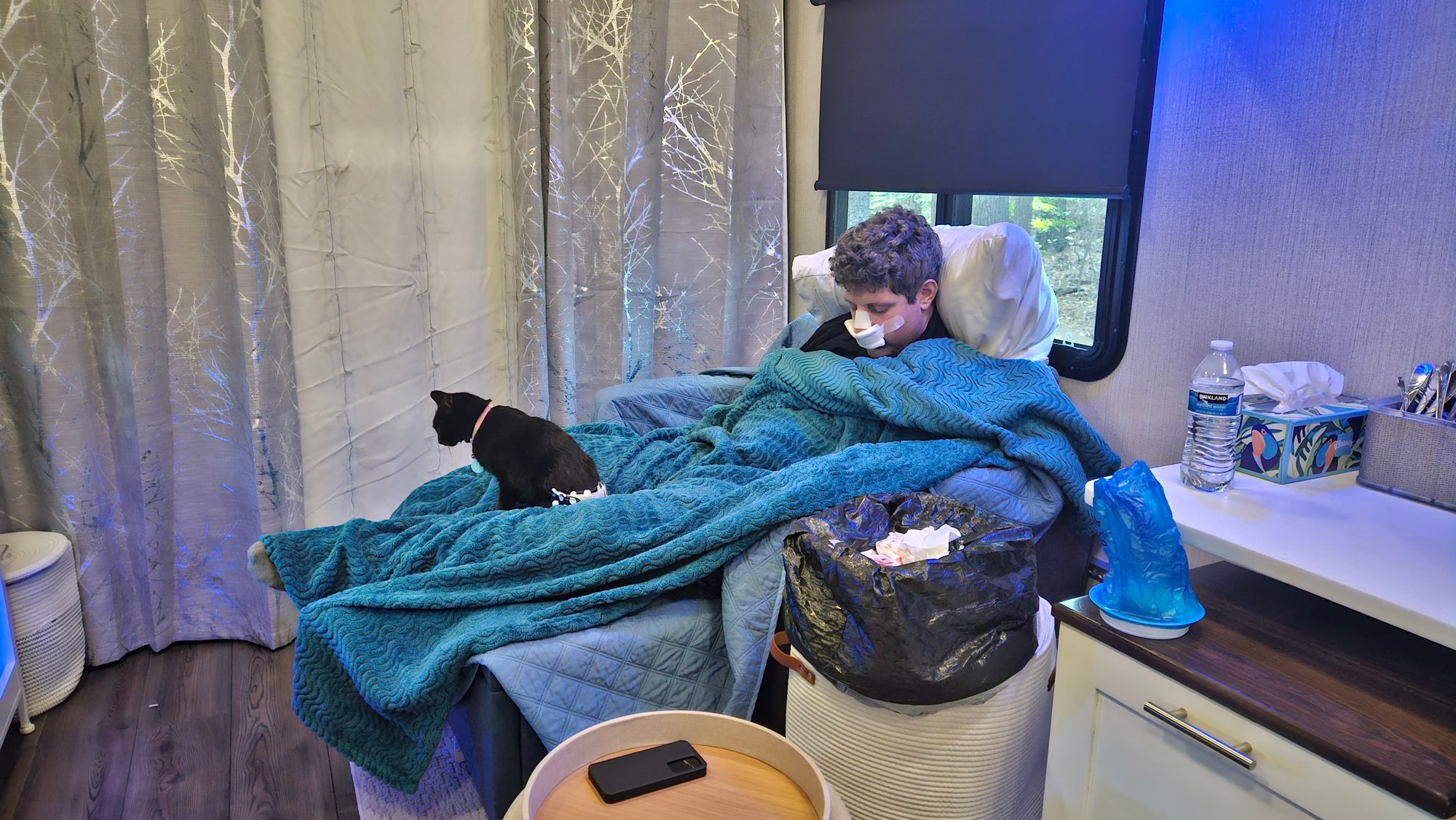
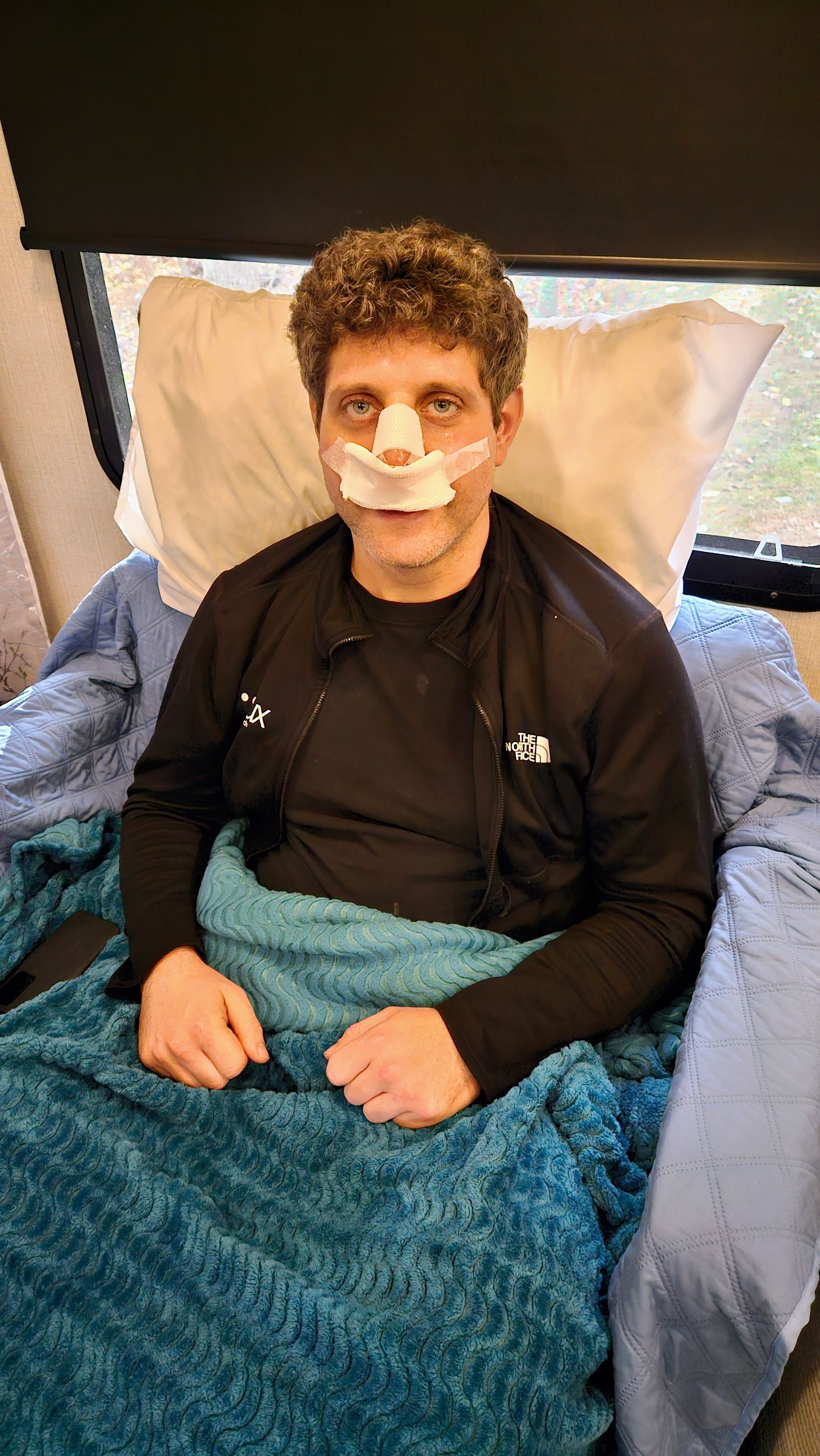
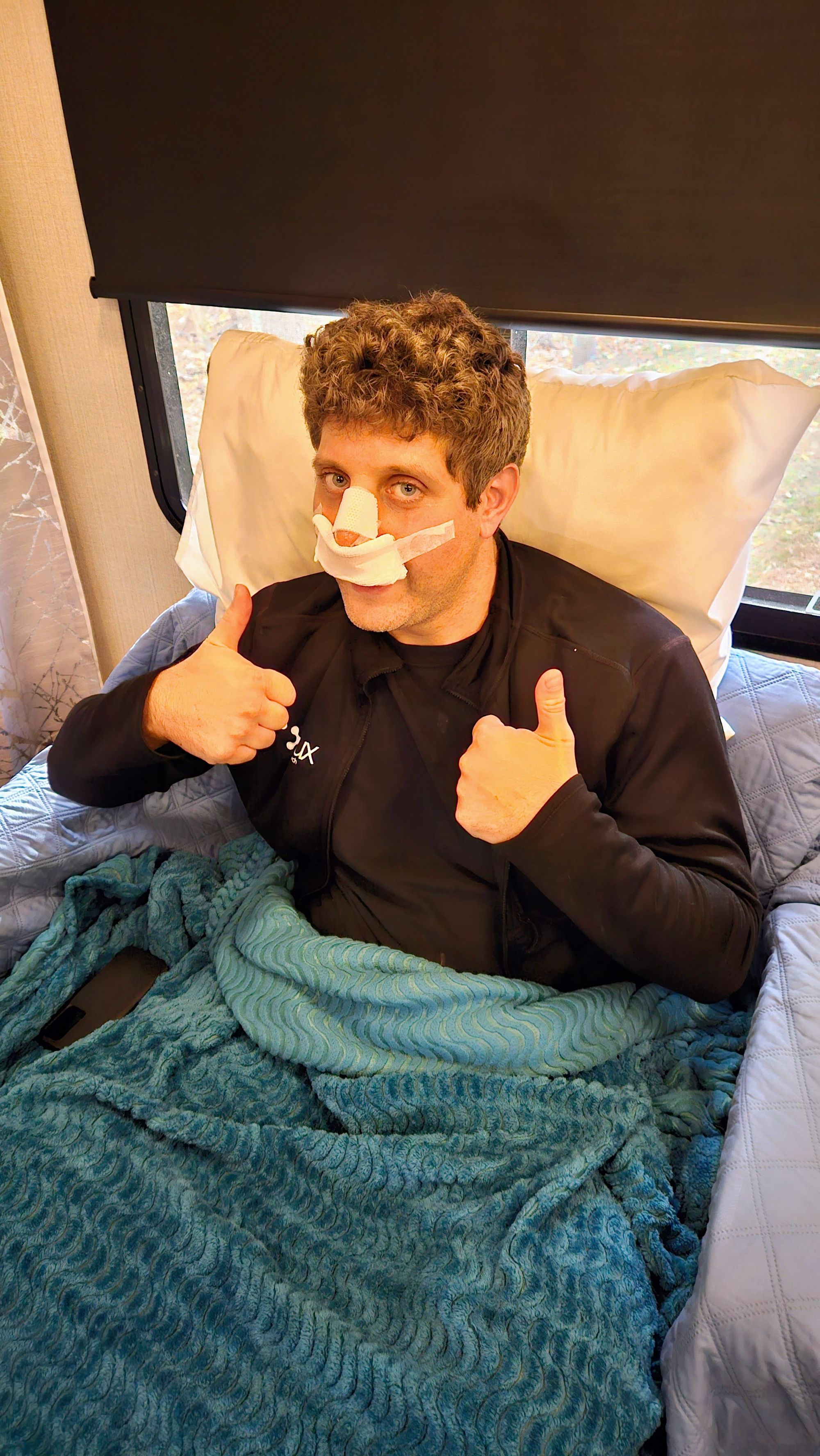
First days of recovery with help from my emotional support kitty
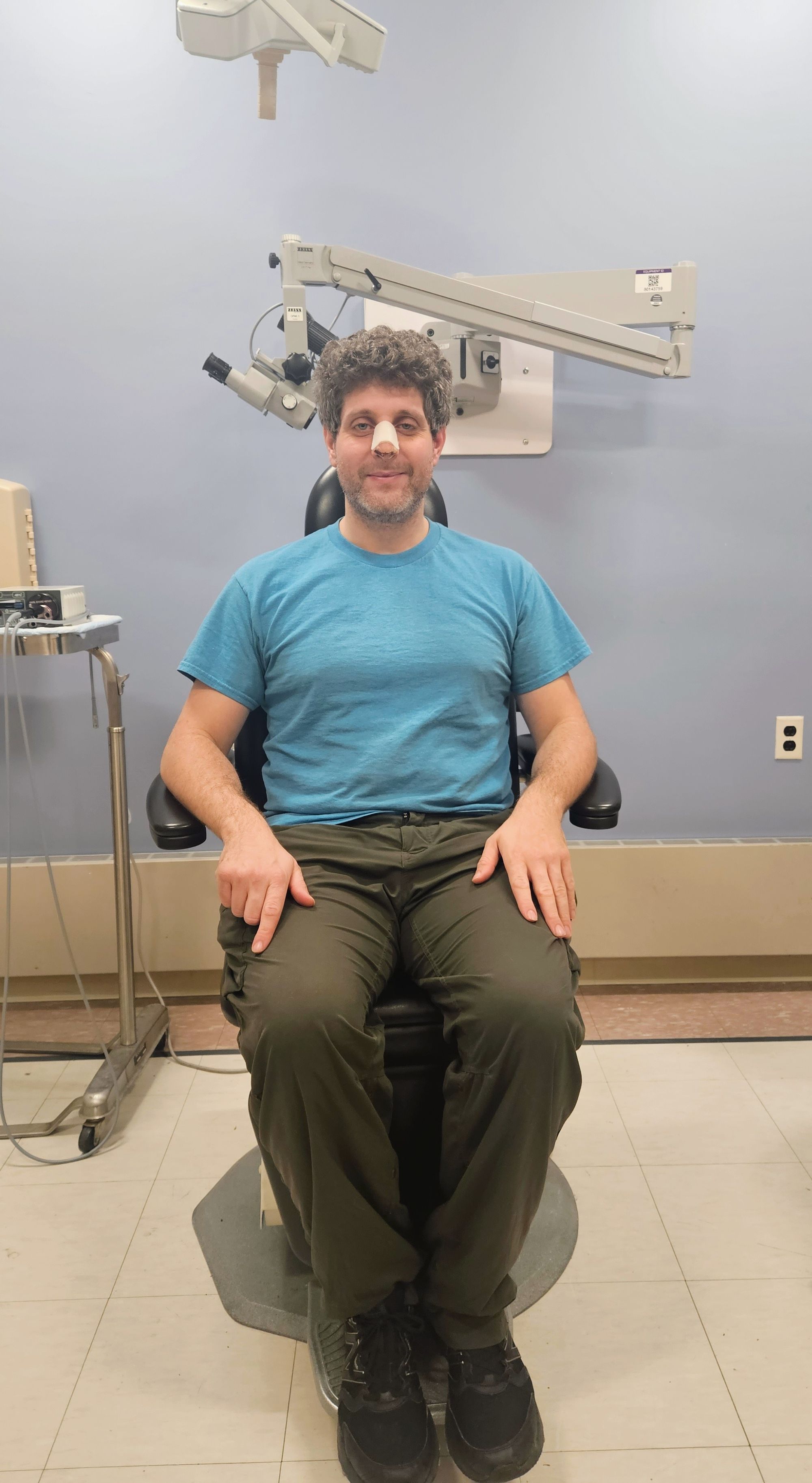
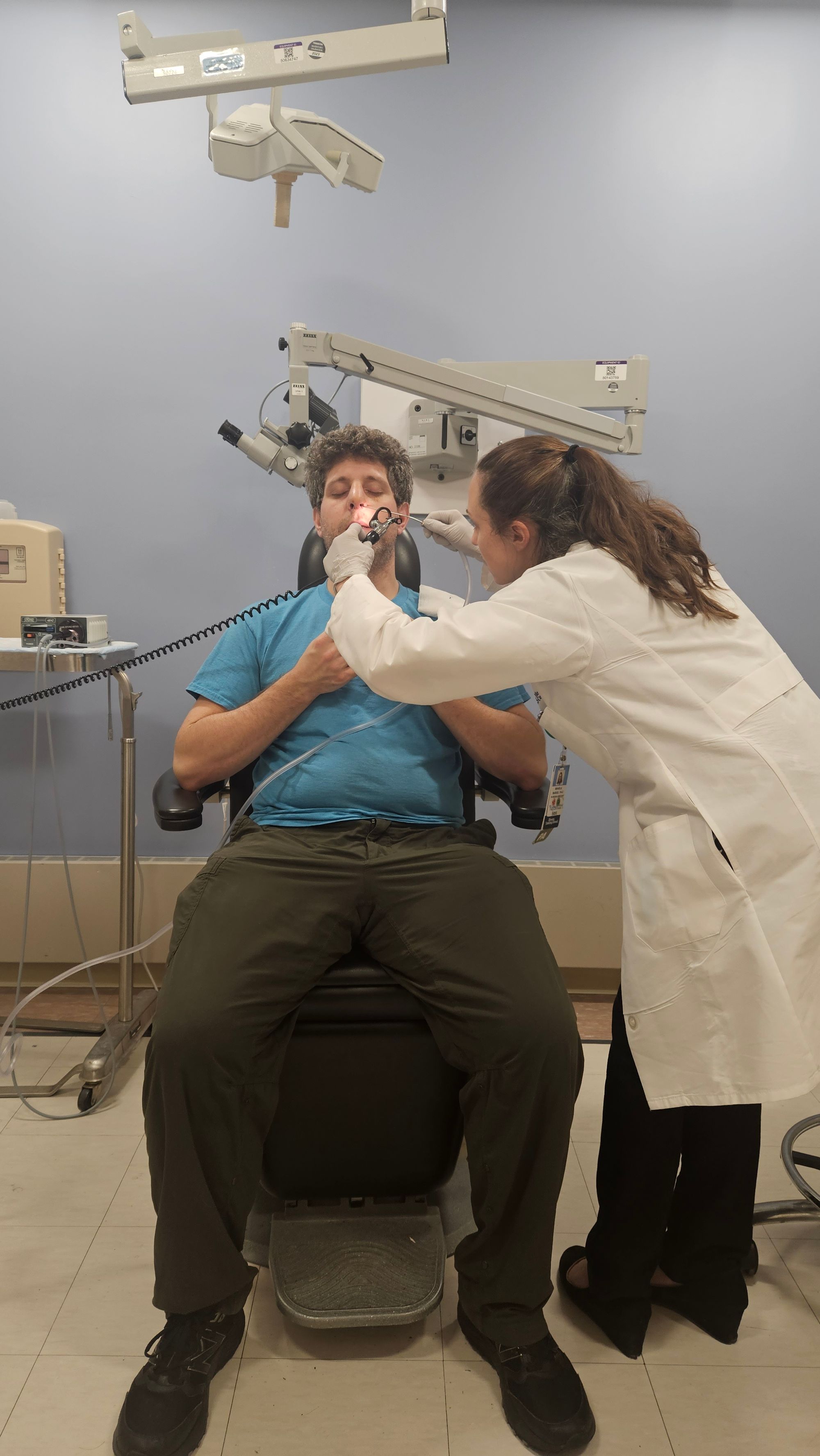
Splint removal
Starting to eat solid foods again was interesting
The last of the swelling could take weeks or even months to go down completely, but about a week after the surgery, I was already feeling moments of breathing comparable to my clean room and 12,000ft days. This was very promising. It's only gotten better since then.
Even though Boston was the right choice for this surgery, we often think about the travel life and how it opens up opportunities to seek medical care from the best of the best. If we need a specific specialist, no matter where in the country, we could bring our entire home there. That's pretty awesome. And to anyone worrying if an RV is a comfortable enough place to be sick or recover from procedures, in my experience, I much preferred being in the trailer as opposed to staying in a house or hotel during my recovery. This RV is home.

